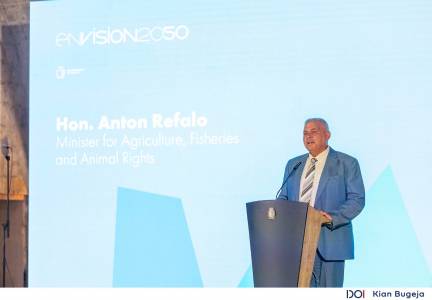The Minister for Agriculture, Fisheries and Animal Rights, Anton Refalo, launched the Agricultural Land Protection Regulations, 2025. This new framework of legal measures is designed to safeguard and promote the sustainable utilisation of a vital natural resource: agricultural land.
The newly introduced regulations, based on the Agricultural Land Reform White Paper of 2022 and the Agriculture Act of 2024, create a detailed legal framework aimed at ensuring that land is registered and actively cultivated in line with established agricultural best practices. The Malta Agricultural Resources Agency will take charge of managing unregistered land until a rightful owner is identified.
Minister Refalo emphasised that these initiatives embody the Government’s vision in terms of sustainability and the fundamental need for Malta to continue producing its food and protecting its identity.
“This marks a pivotal moment for the agricultural sector in our country as we continue protecting Malta’s agricultural land. The purpose of these regulations is not to obstruct farmers, but rather to support them. A new system is being developed to encourage sustainable and equitable agricultural practices, address abuse, and safeguard the land for future generations,” Minister Refalo emphasised.
The regulations impose strict restrictions on the advertising and sale of agricultural land for non-agricultural purposes to safeguard the land’s primary function: food production and the preservation of rural heritage. For more information, one can visit https://ruralaffairs.gov.mt/artagrikola/. The registration period is now open and will conclude in two months.
The conference was also addressed by the Permanent Secretary within the Office of the Prime Minister, responsible for the Implementation and Coordination of the Malta Vision 2050, Ronald Mizzi, who presented the Vision, emphasising that, “The Malta Vision 2050 regards agricultural land as a crucial component of sustainability. This approach focuses on food security, bolstering local produce, and enhancing the environment, climate action, biodiversity, and the principles of a green and circular economy. We are constantly meeting stakeholders towards a collective effort, focused on aspirations that enhance our strength, emerging from a shared commitment to a unified vision aimed at achieving a sustainable future and improving quality of life for all.”
![]()








